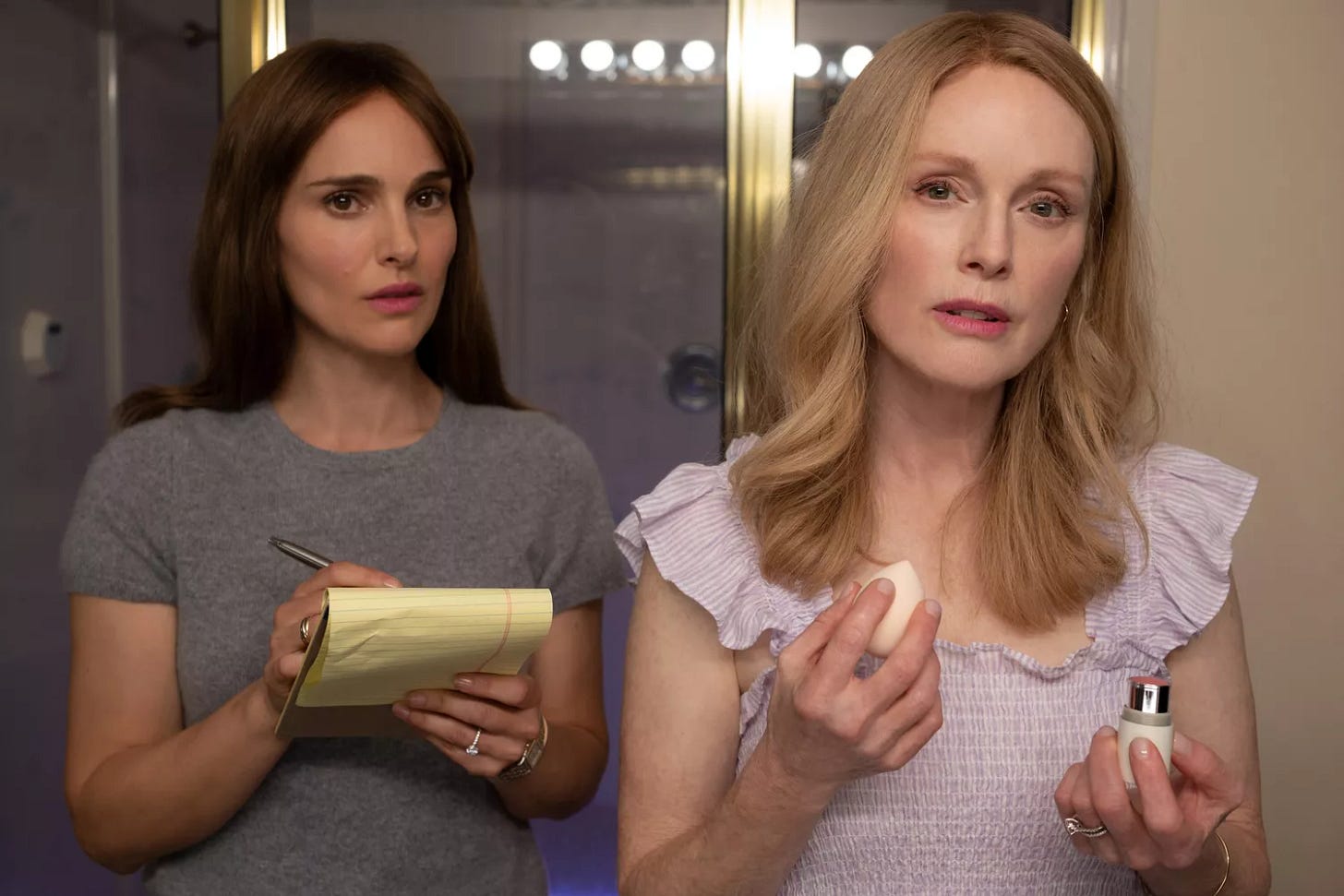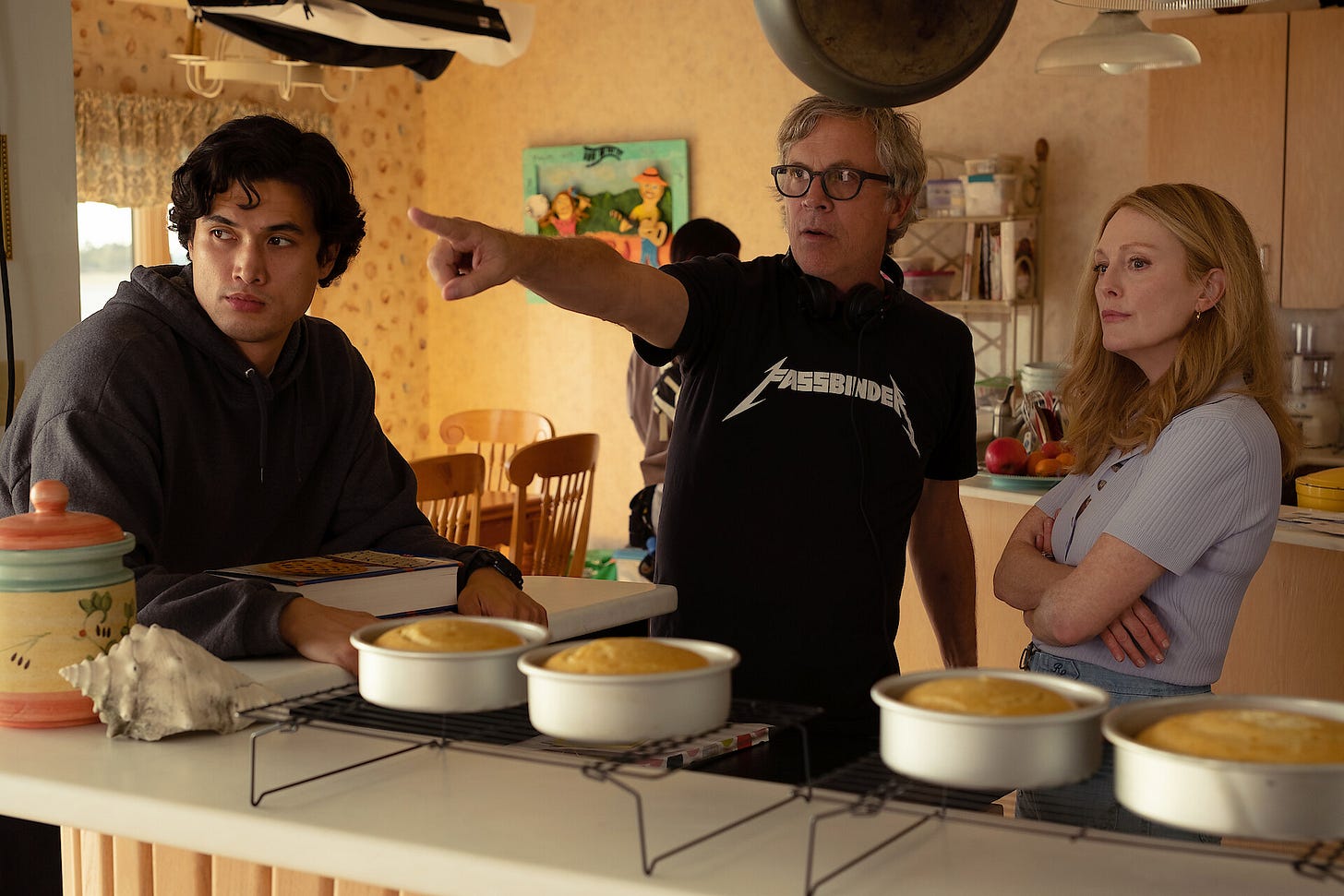I Don't Think We Have Enough Hot Dogs
May December is my favorite film of the year
This post contains spoilers for May December.
Usually after I do an event, I spend a solid 24 hours mentally berating myself for saying the wrong thing, being embarrassing, making mistakes, etc. Sure, I reflect on the good times, too, but in general my inner critic is quite loud and she not only survives but thrives after I’ve just spoken to a room full of people. When I got back from New York, this feeling was magnified tenfold because I’d just spent several days with friends, speaking about myself, sometimes under the influence of a strong (on fire) cocktail. I was assured that I’d been talking a normal amount and hadn’t exactly stood on a table and put on a one-woman show, but sometimes when I go out I think about a quote from Steve Martin’s book-turned-film Shopgirl that I’ve remembered since the first time I read it in my freshman year of college: “She can, when the occasion calls, become a wisecracker and buoyant party girl. This mood, Mirabelle thinks, sometimes makes her the center of attention at parties and gatherings. The truth is that these episodes of gaiety merely raise her to normal, but for Mirabelle the feeling is so exceptional that she believes herself to be standing out.” (Reading this now, I’m like, “damn, was Steve getting paid by the word?”) You probably didn’t suspect I was going to start a post about May December with a quote from Steve Martin’s fiction, but I like to keep the people guessing.
What I’m saying is, I had a vulnerability hangover of the highest magnitude, and so the morning after I got home I needed to sit in silence while not thinking about myself. So I watched May December on Netflix, and it quickly became my favorite (new) movie of the year.
May December reinforced what I’d already suspected: my favorite living director is Todd Haynes. The Brief Encounter framing device in Carol? I love that. Far From Heaven, a heavily Sirk-inspired melodrama? Of course. Mark Ruffalo ripping up all his carpet? And filming in Cincinnati? And Anne Hathaway getting really mad? You know I love Dark Waters! I’ve actually only seen four of his films so it may seem premature to say he’s my favorite director, but whatever, this is my newsletter so I’m making an official declaration.
What I love so much about his work, for starters, is that we like the same things. David Lean, Douglas Sirk, but most importantly the idea of loving something intensely and taking it very seriously while also just slightly making fun of it. I think this might actually be the definition of camp, but I haven’t read that Susan Sontag essay since college and I’m certainly not about to go read it again now so I suppose we’ll never know. I often find that it’s difficult to talk about any kind of art or entertainment with people who idolize something and can’t hear even light-hearted criticism of it (and I’m only sort of talking about Swifties here). It’s just not a fun way to engage with anything. For example, I love Gilmore Girls sincerely and wholeheartedly. Watching it got me through some lonely times. And I love to make fun of it, because parts of it are weird and nonsensical and also, all of Rory’s boyfriends are terrible. That doesn’t mean I love it any less.
Am I comparing Todd Haynes to Gilmore Girls? No. But here’s my point: May December is a movie about a serious topic, which is essentially a predatory “relationship” (i.e., abuse) between a thirty-something woman and a thirteen year old boy. It’s based in some ways on Mary Kay Letourneau and her eventual husband, even down to mimicking their physical appearances. It’s a horrifying topic, one that a different or more literal director could easily make into something moralistic (and boring).
But Todd Haynes isn’t interested in that moralistic vision (although, to be clear, the film never suggests that their “relationship” is equal or ethical…quite the opposite). Instead, he delves into the complicated and weird characters, letting us see them manipulate each other to get what they want.
We meet them when Gracie (Julianne Moore) and Joe (Charles Melton) are married, their sordid past mostly behind them (aside from the boxes of poop that get mailed to them occasionally by haters). They now have children who are even older than Joe was when he met and was seduced by Gracie (although, as she later lisps at him, “you seduced me!”). And now their past is back in the form of Elizabeth Berry (Natalie Portman), an actress who’s playing Gracie in a film about their lives. She’s in town to research her role, which basically means attending a barbecue with them and then interviewing various people from their lives. And if I was writing flap copy, I’d say something like, “But Elizabeth’s presence dredges up long-buried doubts and questions. Will their marriage survive?”
Todd Haynes knows this is a lurid topic, one we’ve seen splashed across headlines, and he plays with that expectation of drama. If you’ve read about the film, you’ve read about the scene where intensely dramatic music plays as Gracie stares into the fridge and the audience assumes she’s about to utter something life changing. “I don’t think we have enough hot dogs,” she finally says.
That’s far from the only funny part of the movie. So many of the side characters made me laugh, and don’t forget that when Gracie is introduced she’s in the midst of a conversation about not wanting to meet celebrities: “You remember what happened when I met Judge Judy.” I wish I knew!
And much like a Sirk film, everything’s over the top. But instead of Jane Wyman being blinded and then later cured of blindness by Rock Hudson, we have Julianne Moore with the most pronounced lisp we’ve ever heard. As a lisp-haver (it used to be something I was embarrassed about and essentially caused me to stop speaking as a kid; now I’ve rebranded it as cute), I was at first put off by just how over the top it is. I mean, no one says baseball like that. But I came around—not only is it necessary for the plot, but also, as Ann Beattie told Rufi Thorpe in an interview read by my friend Lauren who then sent it to me, details are free, and no one understands details better than Todd Haynes.
A large part of the film is about these two women, Gracie and Elizabeth, wrestling with each other, the truth, and our perception of them. Elizabeth is the good and normal one, we initially think. But, as becomes clear sometime around the moment where she pretends to have sex with Joe in the pet shop (oh, yeah, did I mention that Gracie and Joe initially got together because they worked in a pet shop? Details really are free!), Elizabeth is far from normal. And, as she slips into Gracie’s persona in ways both small and large and lisping, perhaps she’s not as in control or self-aware as she thinks she is. One of the funniest lines happens when she’s looking at the tapes of kids auditioning to play Joe in the movie. “They’re cute, but none of them are sexy,” she says about a group of thirteen year old boys.
Joe, of course, is an adult now, the same age as Elizabeth. As she notes, she’s only begun thinking about having children, while his are in college and graduating from high school. But as we see how Joe interacts with Elizabeth, we realize that he’s the heart of the film. Apparently Charles Melton had to gain forty pounds to play this role because he was simply too cut before, but really all that does is give him a slight belly. Mostly he embodies this part with his posture, with the blank face of someone who’s resigned to a life he didn’t really choose. He’s often reluctant to speak and reluctant to rock the boat—but Elizabeth’s presence makes him start to question things, at first to himself and then out loud. His gradual realization—not verbalized so much as felt, shown across a face that becomes more expressive as the film goes on—that what happened to him wasn’t okay is nothing short of heartbreaking. He and Gracie have a big fight right before their twins graduate from high school, and he doesn’t sit with her in the stands. Instead, he stands off to the side, sobbing as he watches the kids walk across the stage, thinking (presumably) about all that he didn’t get to experience in his childhood. He didn’t have normal teenage years because he was being groomed by a woman who was in prison and, then, having his child. And I cried, too! It was a genuinely moving moment that snuck up on me in a film full of delightful melodrama. Todd Haynes: the man can do it all.
I won’t spoil the final scene for you (although I did kind of spoil most of the emotional beats already), but it was so sharp and made me think of the brilliant final scene of TAR.
I have no real thesis here other than that you should see May December and no one is doing it like Todd Haynes. This is a film that, like all of his work, isn’t for everyone…but it sure was for me. May December is currently streaming on Netflix.
I’m spending the next couple of days catching up on posts so I can get them scheduled before the new year, so I’ll be back in your inbox soon (a promise or a threat? You decide!). See you soon. xo



once again I read an entire post about a movie I haven't even seen and now, after having major plot points spoiled for me, want to see it more than ever -- such is your power. (I also thought from the poster alone that May December was about a relationship between Natalie Portman and Julianne Moore and kept thinking, I mean, there's an age difference . . . but is it stark enough to really be calling it May December? How old are they supposed to be in the film? So thanks for clearing that up.)